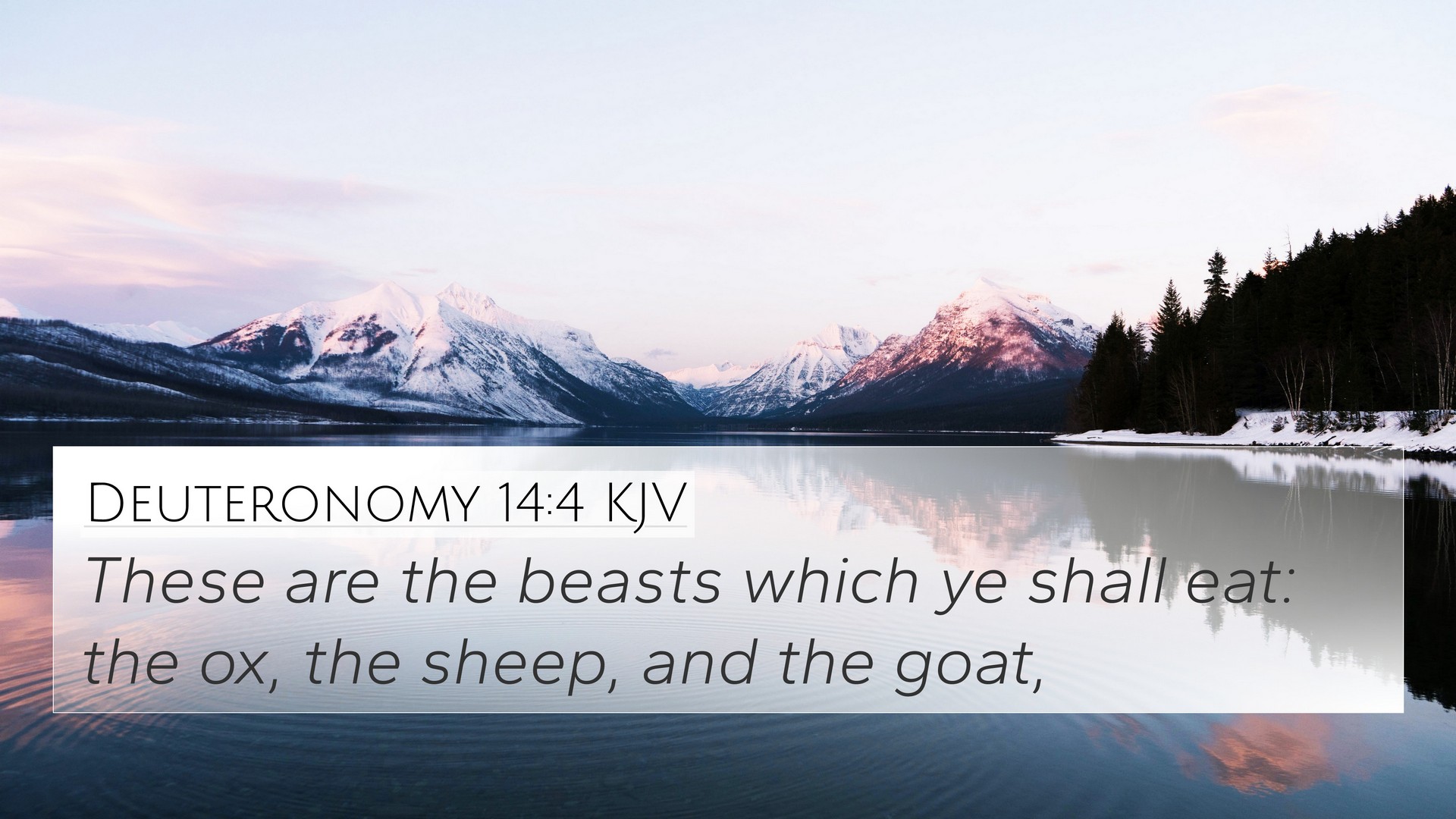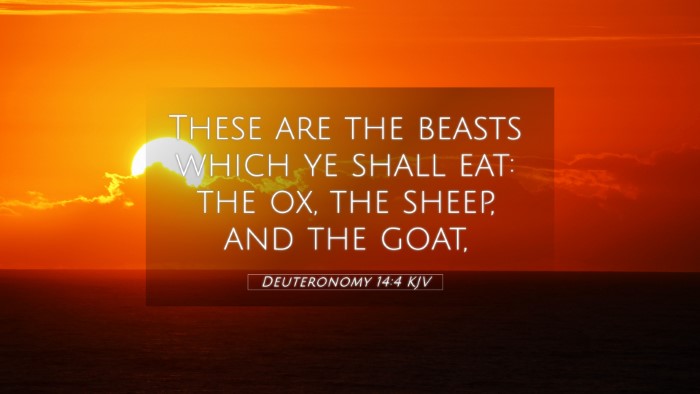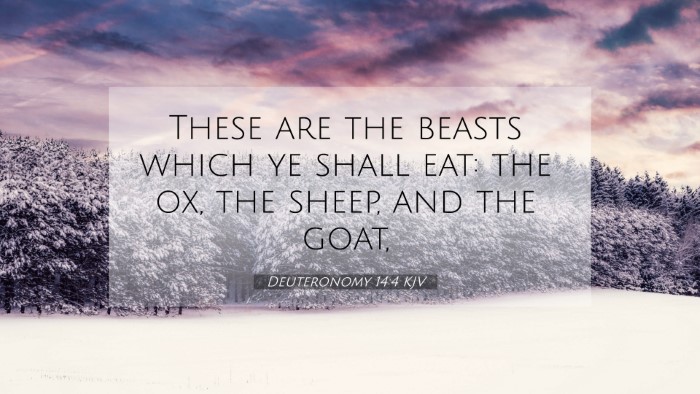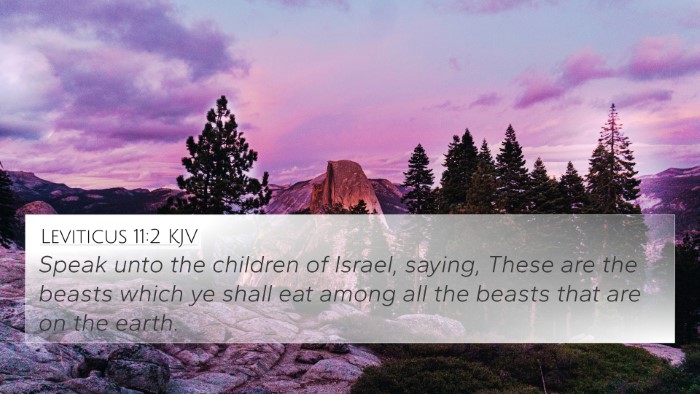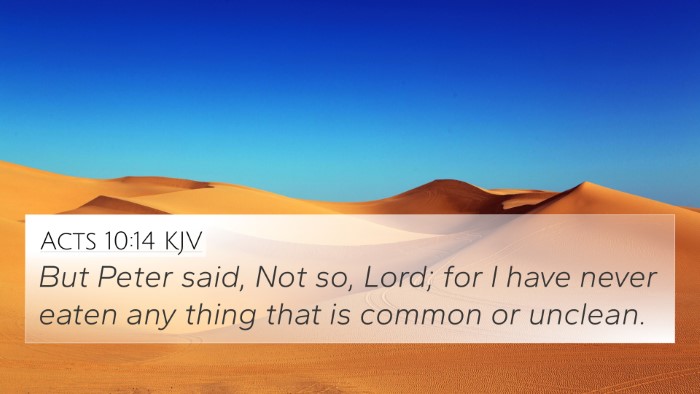Understanding Deuteronomy 14:4
Verse: "These are the animals which you may eat: the ox, the sheep, and the goat." (Deuteronomy 14:4, NKJV)
Summary of Meaning
Deuteronomy 14:4 provides a directive from God to the Israelites regarding dietary laws. This verse highlights the importance of distinguishing clean animals from unclean ones, establishing guidelines to promote holiness and discipline among the people of Israel. By choosing specific animals for consumption, the Israelites were to maintain a relationship with God that involved obedience to His commandments.
Thematic Exploration
- Holiness: The dietary laws speak to the concept of holiness, requiring the Israelites to follow divine commands.
- Obedience: Obeying these laws reflected the larger call to follow God in all areas of life.
- Identity: These instructions helped the Israelites maintain a distinct identity among other nations.
Comparative Analysis
This verse connects to various other scriptures, offering insights into God's desires for His people. Below are several Bible cross-references that relate closely to Deuteronomy 14:4:
- Leviticus 11:2-3: Outlines clean and unclean animals.
- 1 Timothy 4:3-5: Discusses the sanctity of God’s creations in relation to dietary choices.
- Matthew 15:11: Jesus speaks on what defiles a person, emphasizing the heart over dietary laws.
- Acts 10:14-15: Peter receives a vision that reinterprets dietary restrictions, extending the message of purity to all.
- Romans 14:14: Discusses how personal convictions about food relate to faith and communal life.
- Hebrews 10:1: Reflects on how the laws were a shadow of good things to come, indicating the transition from old to new.
- Mark 7:18-19: Jesus clarifies the significance of food laws, indicating a move towards internal cleanliness.
- Genesis 1:29: God's original dietary provisions for humanity, setting a foundational understanding of sacred food.
- Exodus 23:19: Similar directives about the use of first fruits and offerings demonstrate the connection between diet, worship, and God's holiness.
- Colossians 2:16-17: Encouragement that dietary laws are a shadow of what is fulfilled in Christ.
Insights from Public Domain Commentaries
Integration of insights from public domain commentaries sheds light on the depth and implications of the verse:
- Matthew Henry: Henry emphasizes the spiritual significance of clean and unclean animals, pointing out that they symbolize the moral purity God desires in His people.
- Albert Barnes: Barnes explains that these laws served to keep Israel distinct and that obedience to such commands was a matter of national and spiritual identity.
- Adam Clarke: Clarke points out that these dietary laws were a matter of health and hygiene as well as signifying deeper spiritual truths about separation from sin.
Application and Reflection
As modern readers reflect on Deuteronomy 14:4, the call to holiness and obedience is still relevant. This verse not only highlights God's concern for His people in terms of physical health but also their spiritual health. Consider how dietary choices—for both physical well-being and spiritual discipline—can lead to deeper faith and commitment to God's teachings.
Conclusion
Deuteronomy 14:4 serves as more than just a dietary guideline; it is a profound teaching on holiness, obedience, and identity for God's people. The connections to other scripture passages enrich our understanding and reveal God's ongoing dialogue throughout the Bible regarding purity and faithfulness. Engaging in Bible cross-referencing will further deepen our comprehension of these themes and their application in contemporary life.
